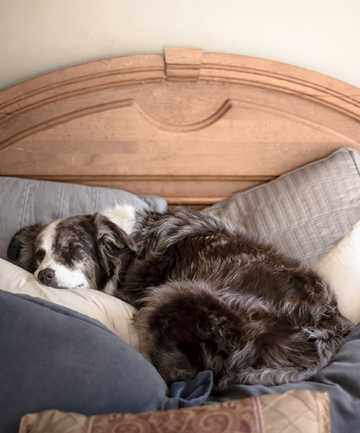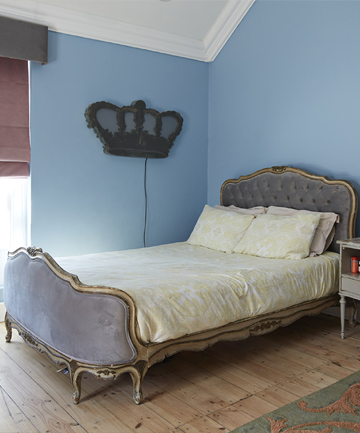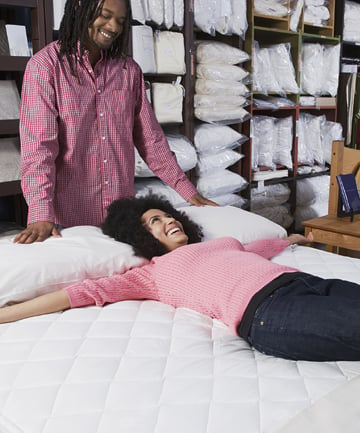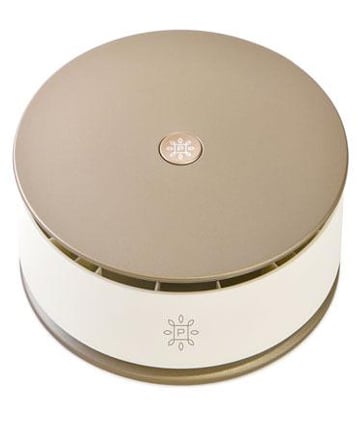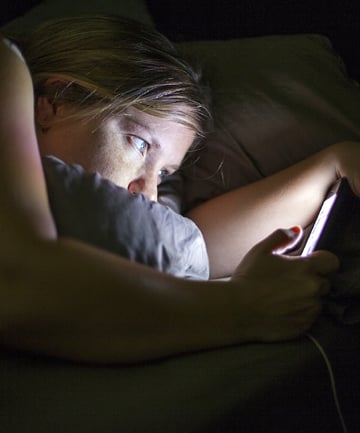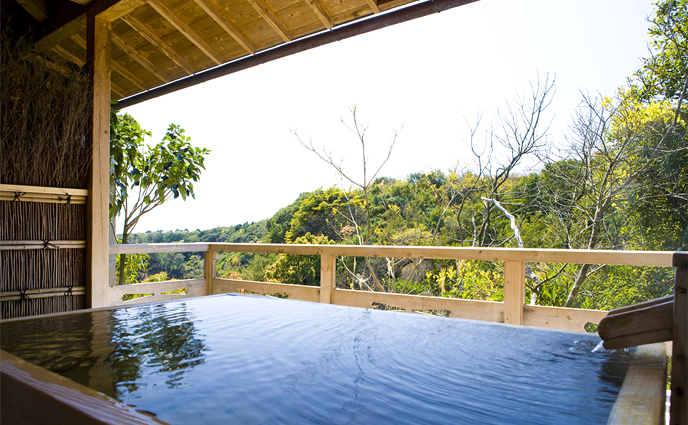Are you sharing your bed with your partner, two cats, a dog and an occasional toddler? While sometimes these factors are out of your control, Dr. Brown recommends having a separate bed for everybody — pets included. "If you like your pets in your room, but find them hogging the bed, try moving them off the bed into a pet bed onto the floor of your room," he says. "Toddlers tend to move a great deal while sleeping and will almost certainly disrupt your sleep, so try to enforce that they sleep in their own bed so you both get a better night's sleep."
Image via Jon Paciaroni/Moment/Getty
Shades of blue are the best for sleep, as they promote longer slumber, according to Brantner. "The ganglion cells in our eyes help send our brain info that regulates our circadian rhythm, and those cells are sensitive to blue," he says. "Blue is also associated with calmness, which can help reduce your heart rate and blood pressure to get you to sleep." Of course, blue isn't for everyone, so other suitable options include greys and similar neutral hues. "While people say red stimulates passion, I'd do my best to stay away from any harsh colors," he adds.
Image via Klaus Vedfelt/DigitalVision/Getty
In terms of comfort, it all starts with selecting the right mattress, explains Wong. "It's worth the splurge for a good mattress that's super comfortable because this is your nightly charging station," she says. "Pro tip: If you're waking up with pain that wasn't there when you went to bed, this is your first sign that it's probably time for a new mattress."
When it comes to foam and innerspring, she recommends getting whatever is comfortable for you. "Foam is good if you have a restless partner (because of its motion isolating properties), but memory foam can cause you to sleep hot," she says, also adding that soft mattresses (which can trap heat) are another culprit when it comes to nighttime overheating. Even so, she recommends disregarding trendy mattresses made with cooling gel: "It's usually a gimmick and buried too deeply in the layers to notice."
Image via Tanya Constantine/Getty
Air quality can be a big issue, affecting even your night's sleep, as well as your overall health. "One-third of our lives are spent sleeping, which means breathing bedroom air," says Dr. Brown. "Poor air quality can lead to poor sleep quality — so it is important not to overlook this aspect of optimizing the sleep environment." If possible, invest in an air purifier, such as The Pure Company's Portable Air Purifier, $99. This will help protect against any poor air quality that is being enhanced by poor ventilation, carpets, furniture, insulation, flooring, upholstery, household cleaning products and central heating and cooling systems, adds Dr. Brown.
It is the 21st century, so it's no surprise if your bedroom is filled with tons of tech gadgets, including a TV, laptop, monitor, alarm clock, smartphone, etc. But for the best night sleep it's best to keep your bedroom as device-free as possible. "75-percent of people have access to devices in their rooms and 66-percent use their phones within 30 minutes of going to sleep, which is a problem for a couple of reasons," warns Brantner. "First of all, the harmful blue light messes with your ability to produce melatonin, and, secondly, devices have been proven to promote stress, especially when social media is involved." He suggests making your room a device-free zone so you can truly relax.
Image via Adam Hester/Getty


